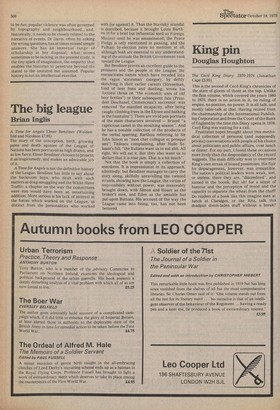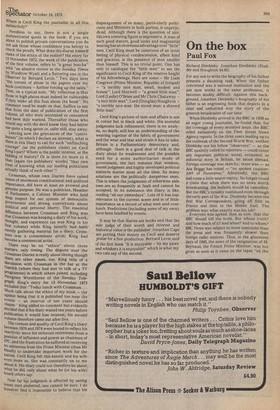King pin
Douglas Houghton
The Cecil King Diary: 1970-1974 (Jonathan Cape £5.95) This is the second of Cecil King's chronicles of the state of gloom of those at the top. Unlike the first volume, which covered the years 1965 to 1970, there is no action in it, no ruling of empire, no position, no power. It is all talk, and mostly table-talk at that. Having retired from the chairmanship of the International Publishing Corporation and from the Court of the Bank of England by the time this Diary opens in 1970, Cecil King was waiting for a call.
Frustrated hopes brought about this methodical collection of personal (and supposedly private) conversations with people of his choice about politicians and public affairs, over lunch or dinner. For my part, I found these occasions more lively than the despondency of the record suggests. The main difficulty was to overcome King's own streak of biased pessimism. His flair for disparagement, however, was irresistible. The nation's political leaders were weak, wet, or useless; there they are, "discredited", and named in the b000k. But oh! for a sense of humour and the perception of mood and the capacity to separate the wheat from the chaff! Do readers of a book like this imagine men at lunch at Claridges, or the Ritz, talk this deadpan doom-laden stuff without a break? Where is Cecil King the journalist in all this melancholy?
Needless to say, there is not a single authenticated quote in the book: if you are about to publish private conversations you do not ask those whose confidence you betray to Check the proofs. What does the diarist himself make of the ethics of the matter? His entry for 15 November 1972, the week of the publication Of the first volume, refers to "a great hoo-ha" With "an abusive review in the Sunday Times by Woodrow Wyatt and a flattering one in the Observer by Bernard Levin." Two days later the torrent of abuse in the papers over my book continues — further forcing up the sales." Then, on a typical note, "My reflection is that those in high places must indeed be vulnerable If they make all this fuss about the book". No comment need be made on that. Suffice to say that from the date of publication of the first volume, all who were interested or concerned had been duly warned. Thereafter those who would sup with the devil knew they had better use quite a long spoon .or, safer still, stay away. Leaving now the grievances of the "contributors" (in which I declare an interest), what is there in this Diary to call for such "unflinching courage" (as the publishers claim) on Cecil King's part? Where is the public interest, or the bidding of history? Or is there no more to it than (again the publishers' words) "that rare treat of knowing what our leading politicians actually think of each other"?
Crossman, whose own Diaries have raised issues of enormous constitutional and political importance, did have at least an avowed and genuine purpose. He was a politician, Member of Parliament, a Cabinet Minister who held deep respect for our system of democratic government and strong convictions about Political and personal liberty. The essential difference between Crossman and King was that Crossman was keeping a diary of his work, thought, and experience (as was King in his first volume) while King latterly had been Merely gathering material for a diary. Crossman was a consummate artist; King had become a commercial artist.
There may be no "ethics" about these matters, only timing. The dispute over the Crossman Diaries is really about timing though there are other issues, too. King tells of a discussion with Crossman in the bar at the Garrick (where they had met to talk of a TV Programme) in which others joined, including Peregrine Worsthorne of the Sunday Telegraph. King's entry for 15 November 1972 included this: "Today lunch with Crossman . . Much talk about the ethics of my book — the Upshot being that it is published too near the events — an interval of ten years should elapse." King added no comment but evidently decided that if his diary waited ten years before Publication it would lose interest; his second volume therefore came out after five.
The content and quality of Cecil King's Diary between 1970 and 1974 were bound to reflect his inactivity since his enforced retirement from a Position of influence and power as chairman of IPC, and the frustration he suffered at receiving no summons from the Prime Minister (then Mr Heath) to undertake important work for the nation. Cecil King felt this keenly and his wife even more so. She was constantly on to me about it. His diary could not therefore be about What he did, only about what he (or his wife) heard others say.
How far his judgment is affected by seeing lesser men preferred, one cannot be sure. I do however find it impossible to believe that his disparagement of so many, particularly politicians and Ministers in both parties, is unprejudiced. Although there is the question of size. His own towering figure is impressive. A man of such good stature, good looks and magisterial bearing has an enormous advantage over "little" men. Cecil King must be conscious of an inner feeling of physical condescension, albeit kind and gracious, in the presence of men smaller than himself. This is no trivial point. One has only to catalogue the "little men" to see the significance to Cecil King of the relative height of his fellowbeings. Here are some:— Mr Liam Cosgrave (Prime Minister, Republic of Ireland) — "a terribly nice man, small, modest and honest"; Lord Shinwell — "a grand little man"; Lord (Leslie) O'Brien and Mr Chris Chataway — "a nice little man"; Lord (Douglas) Houghton — "a terribly nice man: the nicest man: a shrewd little man".
Cecil King's picture of men and affairs is not in colour but in black and white. His scornful judgments lack refinement; there is no analysis, no depth, still less an understanding of the weaving together of the fabric of government and the wear and tear and strain it has to take. Britain is a Parliamentary democracy and, although there is a good deal of talk in the diary about its weaknesses and the possible need for a more authoritarian mode of government, the fact remains that wisdom, sound judgment and highly developed political instincts matter most all the time. So many solutions are the politically dangerous ones. This is where the judgments of otherwise able men are so frequently at fault and cannot be accepted. In its substance the Diary is like reading "all our yesterdays". Lots of it has lost relevance to the current scene and is of little importance as a record of what men said over lunch. Predictions (including some of my own) have been falsified by events.
It may be that diaries are books and that the sole judge of their worth and interest and historical value is the publisher. Jonathan Cape are putting their money on Cecil and deserve praise for a fine production. Bernard Levin said of the first book "It is enjoyable — by my paws and whiskers it is enjoyable!" which is what my two cats say of the second.



































 Previous page
Previous page